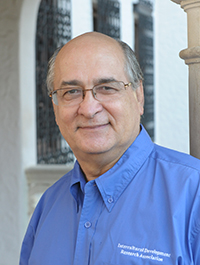• by Hector Bojorquez and Aurelio M. Montemayor, M.Ed. • IDRA Newsletter • June – July 2014 •

IDRA’s OurSchool portal was designed to inform families, parents and educators about educational outcomes in Texas high schools. Parents visit the site to see how well students are prepared for college by looking at SAT and ACT scores, the numbers of students actually going to college, and the percentages of students having to take remedial courses.
The data have been a powerful catalyst for parent groups to approach schools with questions, concerns and ideas for collaboration. One excellent example of this type of collaboration is how the burgeoning PTA Comunitarios in the Lower Texas Rio Grande Valley have used the data to kick start community efforts and collaborations with schools.
A PTA Comunitario is a community-based PTA that is not tied to one particular school but rather is housed in a community organization. IDRA and ARISE, a partner community-based organization in South Texas, have collaborated for nearly six years in piloting this concept in colonias (unincorporated neighborhoods), some of the most economically disadvantaged areas in Texas.
Through an Investing in Innovation (I3) grant from the U.S. Department of Education, IDRA is leading an effort in the Lower Rio Grande Valley to expand the concept to multiple school districts.
The PTA Comunitario process recognizes that once parents have solid comprehensible educational data, they become well-informed advocates interested in collaborating with schools. IDRA’s OurSchool portal has been the source for educational data from the inception PTA Comunitarios. An early accomplishment of the ARISE PTA Comunitario was to form a solid relationship with superintendents in the Pharr-San Juan-Alamo ISD and Donna ISD to focus on the very real issue of dropouts they had noted in the OurSchool portal.
From their inception, the PTA Comunitarios were concerned with math scores on the state-mandated exam (then the TAKS) and with SAT/ACT scores. Across area school districts, PTA Comunitario members surmised that high school math scores reflected a grim reality and that SAT/ACT scores were dismal. The rates of students scoring at or above criterion were in the single digits even for schools that had with good TAKS scores.
As some participants observed, “How can our schools say they are passing the TAKS test, but our students aren’t prepared for college entrance exams?” Parents concluded that schools were actively preparing students for a minimum skills test but not for college. This key insight gave parents grounding and understanding how many schools actually fail to prepare students for college.
In 2011-12 with support from TG, IDRA upgraded the OurSchool portal to include college-going rates and developmental education performance. This information showed the number of students going to college from any high school and how many were required to take developmental or remedial courses once they started college. These costly courses can take several semesters for students to finish while providing no college credit, leading many students to eventually abandon their dreams of college graduation.
Parents in the PTA Comunitarios were prepared with this new information. They understood the data with little need for explanation. So deep was their understanding of the data that they became part of an advisory board that provided input on the portal. The new data showed that, while more students were going to college, a high number were going to two-year colleges and that many were not prepared for college as evidenced by their having to take developmental classes.
For PTA Comunitarios, knowledge of this and all of the data provided by IDRA’s OurSchool portal was crucial in developing a consciousness about what was happening in their schools. It was with this new awareness that they initially approached the PSJA and Donna school district superintendents (Montemayor, 2012). While the results of these initial meetings have allowed for deeper relationships with school districts, their full results were still to come.
The Texas legislature’s passing of House Bill 5 marked a historical turning point in Texas education where an already unsatisfactory, inequitably funded educational system was further weakened by lowering curricular standards and returning to thinly-veiled system of tracking and vocational education. As a result, the default curriculum inTexas no longer satisfies minimum requirements for college access and success.
It is at this juncture that the PTA Comunitarios’ use of the OurSchool portal became indispensable. Since the fall of 2013, new PTA Comunitarios have been forming across the Lower Rio Grande Valley. They began their meetings by reviewing educational data, particularly scores in the new state-mandated test (the State of Texas Assessments of Academic Readiness, STAAR) in Algebra I and Algebra II and college-going data.
The data showed that very few students were passing the Algebra I and Algebra II tests and that students were not prepared for college.
To the parent groups, the obvious response was to ask: “What can we and the schools do to better prepare our students?” Parents were astonished to find that the new curricular requirements no longer even require Algebra II and that the paths to college were obfuscated by a new system of “endorsement,” or specialization, career and job paths. This new regime was universally unacceptable to all PTA Comunitarios in San Benito, Donna, PSJA and Rio Grande City.
The strategy was to show parents the state of education for them to become better advocates for their students. In the latest case, parents were shown the outcomes of a weak educational system and, when presented with current educational law, the conclusions were clear: without community action, schools are poised to take the path of least resistance and not work toward college for all.
And now, PTA Comunitarios are acting. Armed with powerful data and strong positions, they are making their presence known.
Advocating for students, PTA Comunitarios have collaborated and or initiated the following activities.
- Presented at the Mesa Comunitaria Educativa Rio Grande Valley community convening in January, where PTA Comunitario’s positions of “college for all” were shared with parents, school administrators and college presidents (Bojorquez & Montemayor, 2014; Bojorquez, 2014).
- PTA Comunitario statements were presented in testimony to the Texas State Board of Education (Montemayor, 2014).
- The first PTA Comunitario, ARISE South Tower, held a press conference in March with all the leading Spanish-language media in South Texas. Eva Carranza and Anita Gonzalez, past and present organization presidents, stressed the importance of preparing all children for college and given real choices.
- Members of new PTA Comunitarios visited San Benito schools and presented their deep knowledge about graduation requirements and educational outcomes and were invited to present to five parent groups in the district.
The actions taken by PTA Comunitarios are clear, direct and targeted toward assuring that communities are informed about the new Texas graduation requirements. This would not have occurred had it not been for the consciousness that was formed by quick and easy access to data. The informed parents are now taking action.
Resources
Bojorquez, H., & A.M. Montemayor. “Mesa Comunitaria Educativa – Community Collaboration for Education Advocacy,” IDRA Newsletter (March 2014).
Bojorquez, H. “Rio Grande Valley Community Commits to Ensuring High Academic Region for All Students,” IDRA Newsletter (April 2014).
Montemayor, A.M. “Texas Parents and Civil Rights Groups Call for High Quality Curriculum,” Testimony presented to the Texas State Board of Education (January 28, 2014).
Montemayor, A.M. “Hosting Superintendents, Quizzing Candidates and Marking Maps A Fully Engaged PTA Comunitario,” IDRA Newsletter (March 2012).
Posner L., & H. Bojorquez. “Knowledge for Action – Organizing School-Community Partnerships Around Quality Data,” IDRA Newsletter (January 2008).
Hector Bojorquez is an education associate in IDRA Field Services. Aurelio M. Montemayor, M.Ed., is a senior education associate in IDRA Field Services. Comments and questions may be directed to them via email at feedback@idra.org.
[©2014, IDRA. This article originally appeared in the June-July 2014 IDRA Newsletter by the Intercultural Development Research Association. Permission to reproduce this article is granted provided the article is reprinted in its entirety and proper credit is given to IDRA and the author.]


